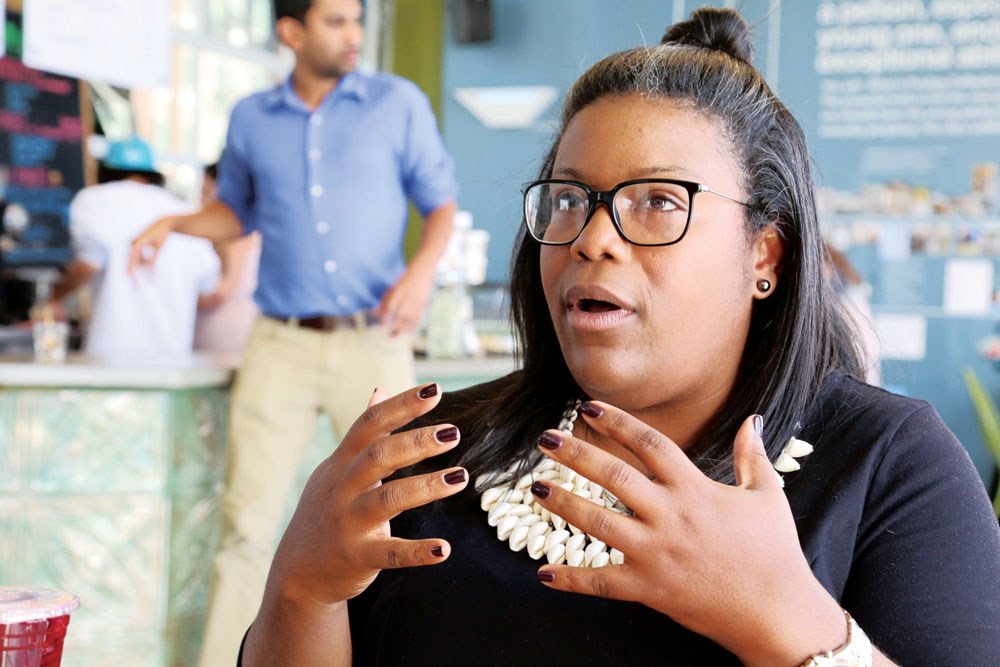
In a wide-ranging interview, Jennifer Bacon shared her thoughts on subjects ranging from her campaign to her priorities as a board member.
The Front Porch sat down with newly elected District 4 school board member, Jennifer Bacon, to discuss her recent election win and her priorities. Bacon was supported by the teachers’ union, which opposes many recent board reforms implemented around school choice, accountability and school closure. The following interview has been edited and condensed.
You won the election, beating out two other candidates in District 4. What does that mean?
[My opponents’] dynamic allowed me to have something unique… It’s like I’m speaking a language that isn’t reform or anti-reform. What I started to say was listen, what does community-driven leadership look like, which means we need, together, to identify the problems we have? Let’s lean on each other to solve them. For me, that meant understanding the whole landscape, not just the anti-reform space or reform space.
Elections are also important because they demonstrate where public will is. With three candidates and two carrying a lot of votes [against reform], that means something. I also feel like … people are prepared to understand we have to have these conversations right now. That’s what I’m looking forward to doing with the board. When I come, I come as an elected official. Sure, I got 42 percent of the votes, but another 20 percent voted for a non-incumbent, and they want to see change.
The Denver Classroom Teachers’ Association (DCTA supported you). What does that mean for you and the school board, which is largely pro-reform?
I didn’t come to the DCTA with fire and brimstone. I said, let me tell you what I see is happening in this district. It just so happens that we agreed on a lot of things. What we need to understand about the charter movement is what is the ending? Is it literally being 50% of our schools?…The fact that the question’s on the table, that in and of itself is an issue.
The other thing is I’ve been a teacher. I was also a union member when I was in the classroom. I understand what that work does to support the professional.
[The union] creates mandatory floors. It creates accountability. I’ve worked a lot with teachers in charter, innovation, and district schools. There is something to be said about doing something to save this profession, especially in this day and age. That’s what I talked to them about. I also said, I know what the impact is of school closure.
What are your priorities as you join the school board?
Honestly, the first priority is understanding where schools are at, particularly around closure and performance, and evaluating what is DPS’ role in either the failures or successes. The data to me isn’t exactly as objective as people think it is.
The other thing is we have to understand our leadership structures, and what’s going on by way of the equity measure, the parent survey, all of those things. One of the things that’s really important, that I have always loved about me as a candidate, is that I come with relationships for parents and kids in schools to be able to create a picture outside of the School Performance Framework (SPF) indicator.
I know the board has heard a lot about school closures. but it’s actually been true that when schools close a charter pops up. Not everybody hates the charter schools. I don’t. I give DPS the credit for saying we actually have the tools to meet these needs now. I worked at DSST. I know what they do well…but we haven’t been doing it in places where it really matters.
We have to now become more efficient, clean up our messes, and level the playing field. That means it’s not about finding new money all the time. It’s reallocating the way we’re spending it.
From afar, I’ve only watched the board talk. Now being in it is a completely different world. I’m looking forward to knowing versus making conversation. What I want to be is a conduit for communication so we can be held accountable.
What is the definition of a quality school?
When we say high-quality schools, that means two different things to two different groups. Who has the power in determining them? I think that…it is our job as a district to bring the quality. You tell me what you need. I will give you the best services to get there versus me telling you…this is what you’re going to have, right? At least that’s my vision.
For me, I say this: the kids need to not only master reading, writing, science, but they need to know who they are in their place in this world as leaders. That identity piece and cultural competency as well as self-determination are critical. I think…of public education where the outcome is to create citizens who are able to carry on for themselves.



My name is Imani. I am a Sr. Citizen in Georgia. I just watched a short documentary on your campaign but it did not say if you won. I had to look online and search.
Congratulations and I hope you will continue to explore Politics. I am proud of you.
I’ve read the response to the last question several times, and I still have no idea what she is talking about. What are the two things, and who are the two groups? What does it mean to know who you are in your place as a reader?
Ms. Bacon did not respond to our request for confirmation about the accuracy or clarity of this edited interview, and a transcription error resulted in “readers” instead of “leaders.” It appears that she is talking about families and professional educators as the two groups. Unfortunately, she was not available to shed more light on the “two things” mentioned in that passage.”